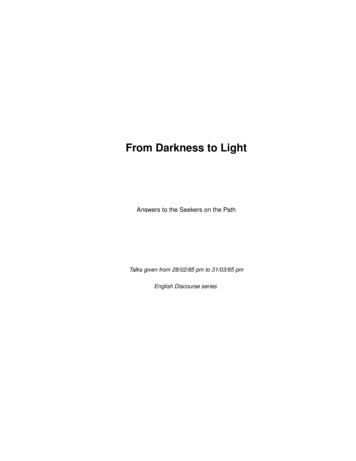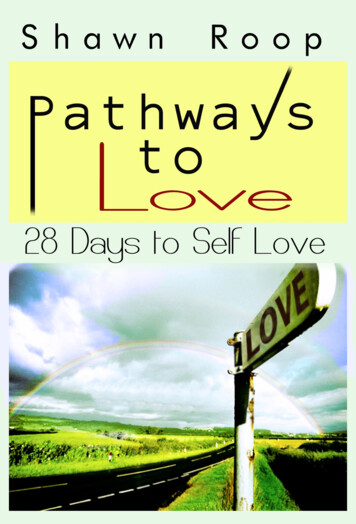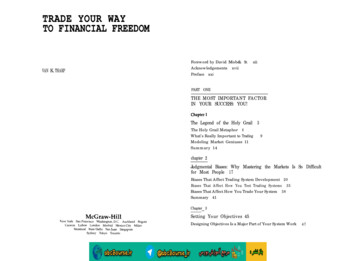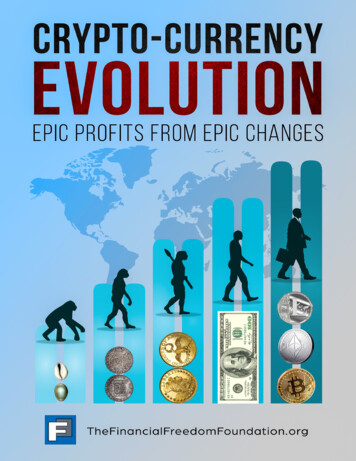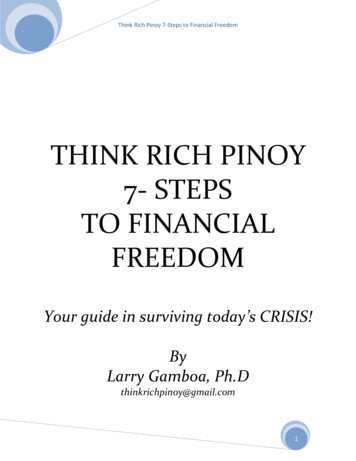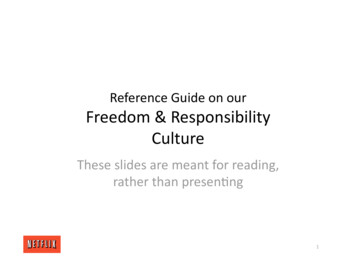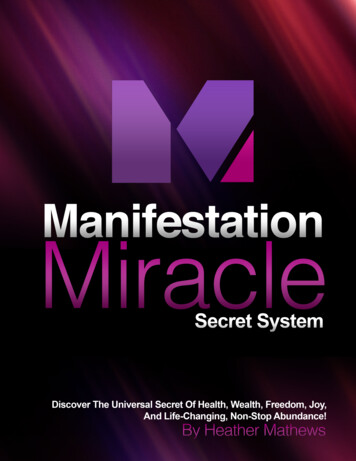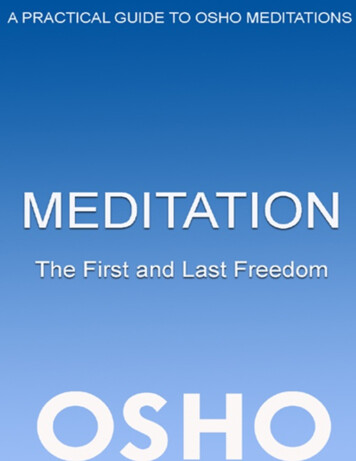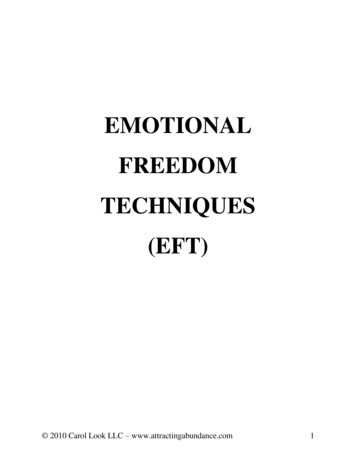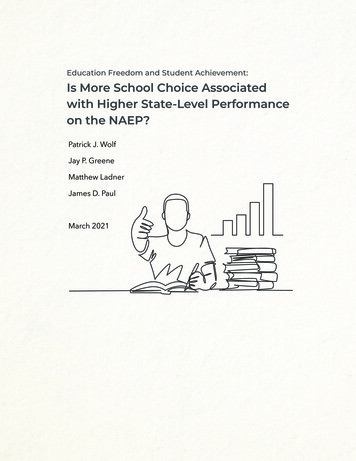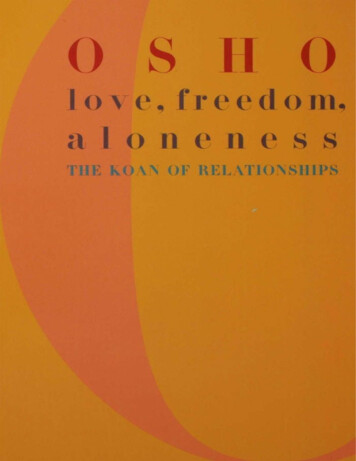
Transcription
Love, Freedom,Aloneness
ALSO BY OSHOThe Book of SecretsOsho Zen TarotMeditation: The First and Last FreedomCourageCreativityMaturityOsho Transformation TarotAutobiography of a Spiritually Incorrect MysticAUDIOOsho Book of SecretsOsho Meditations on ZenOsho Meditations on TaoOsho Meditations on YogaOsho Meditations on BuddhismOsho Meditation on SufismOsho Meditations on Tantra
Love, Freedom,AlonenessTHE KOAN OF RELATIONSHIPSOshoSt. Martin’s GriffinNew York
Edited by Sarito Carol NeimanLOVE, FREEDOM , ALONENESS.Copyright 2001 by Osho International Foundation. All rights reserved.Printed in the United States of America. No part of this book may be used or reproduced in anymanner whatsoever without written permission except in the case of brief quotations embodied incritical articles or reviews. For information, address St. Martin’s Press, 175 Fifth Avenue, New York,N.Y. 10010.www.stmartins.comISBN 0-312-26227-2 (hc)ISBN 0-312-29162-0 (pbk)10 9 8 7
ContentsPrefacePART ONE: LOVEChapter One: Lovey-DoveyChapter Two: Real and Unreal—The First StepChapter Three: The Virtues of SelfishnessChapter Four: Attached to NothingQUESTIONSWill you please speak about the difference between a healthy love of oneself andegoistic pride?Why is love so painful?How is it that the inscription on the Greek temple of Delphi says “KnowThyself” and not “Love Thyself”?How can I love better?PART TWO: FROM RELATIONSHIP TO RELATINGChapter Five: The Honeymoon that Never EndsChapter Six: From Lust to Love to LovingChapter Seven: Let There Be Spaces . . .Chapter Eight: The Koan of RelationshipQUESTIONSHow can I know that a woman has fallen in love in reality, and not playinggames?If the jealousies, the possessiveness, the attachment, the needs and expectations
and desires and illusions drop, will anything be left of my love?What is the difference between liking and loving, to like and to love? And also,what is the difference between ordinary love and spiritual love?There are many people I love but I don’t feel committed to. How can I predict if Iwill love them tomorrow?Even if sometimes lovelike feelings arise in my heart, immediately I start feelingthis is not love, it is my hidden cravings for sex and all that.In the East, it has been stressed that one should stay with a person, one person,in a love relationship. In the West, now people float from one relationship toanother. Which are you in favor of?Lately, I have begun to realize how even my lover is a stranger to me. Still, thereis an intense longing to overcome the separation between us.PART THREE: FREEDOMChapter Nine: Tabula RasaChapter Ten: The Fundamental SlaveryChapter Eleven: Beware of the PopesChapter Twelve: Is There Life After Sex?Chapter Thirteen: It Takes a Village . . .QUESTIONSYou said that love can make you free. But ordinarily we see that love becomesattachment, and instead of freeing us it makes us more bound. So tell ussomething about attachment and freedom.My boyfriend feels less and less like making love, and this makes me upset andfrustrated, even to the point where I act aggressive toward him. What can I do?My sex life has become very quiet lately—not that I don’t want sex or that I amnot courageous enough to approach women, but it just doesn’t happen. What amI doing wrong?How can I know if detachment or indifference is growing within?In your vision of a model society, would there be one large commune or a seriesof communes? What would be their relationship to one another?
PART FOUR: ALONENESSChapter Fourteen: Aloneness Is Your NatureChapter Fifteen: Strangers to OurselvesChapter Sixteen: Solitary and ElectChapter Seventeen: The Lion and the SheepQUESTIONSNever belonged, never been on the “inside,” never felt “at one” with another.Why such a loner all my life?Why does my sadness feel more real than my happiness? I want so much to bereal and authentic, not to wear any masks, but this seems to mean so muchrejection by others. Is it possible to be so alone?As I move deeper into meditation and looking into who I really am, I am havingtrouble maintaining any relationship. Is this something to be expected, or have Igone wrong somewhere?Caveat: Two Women and a MonkEpilogue: Embracing the Paradox
PrefaceIn Plato’s Symposium, Socrates says:A man who practices the mysteries of love will be in contact not with areflection, but with truth itself. To know this blessing of human nature, onecan find no better helper than love.I have been commenting my whole life on love, in thousands of different ways, butthe message is the same. Just one fundamental thing has to be remembered: It is not thelove that you think is love. Neither is Socrates speaking about that love nor am Ispeaking about it.The love you know is nothing but a biological urge; it depends on your chemistry andyour hormones. It can be changed very easily—a small change in your chemistry and thelove that you thought was the “ultimate truth” will simply disappear. You have beencalling lust “love.” This distinction should be remembered.Socrates says, “A man who practices the mysteries of love . . .” Lust has nomysteries. It is a simple biological game; every animal, every bird, every tree knowsabout it. Certainly the love that has mysteries is going to be totally different from thelove with which you are ordinarily acquainted.A man who practices the mysteries of love will be in contact not with thereflection, but with truth itself.This love that can become a contact with truth itself arises only out of yourconsciousness—not out of your body, but out of your innermost being. Lust arises out ofyour body, love arises out of your consciousness. But people don’t know theirconsciousness, and the misunderstanding goes on and on—their bodily lust is taken forlove.Very few people in the world have known love. Those are the people who havebecome so silent, so peaceful . . . and out of that silence and peace they come in contactwith their innermost being, their soul. Once you are in contact with your soul, your lovebecomes not a relationship but simply a shadow to you. Wherever you move, withwhomsoever you move, you are loving.
Right now, what you call love is addressed to someone, confined to someone. Andlove is not a phenomenon that can be confined. You can have it in your open hands, butyou cannot have it in your fist. The moment your hands are closed, they are empty. Themoment they are open, the whole of existence is available to you.Socrates is right: One who knows love also knows truth, because they are only twonames of one experience. And if you have not known the truth, remember that you havenot known love, either.To know this blessing of human nature, one can find no better helper thanlove.
PART ONELoveYou will be surprised to know that the English word love comes from a Sanskritword lobha; lobha means greed. It may have been just a coincidence that the Englishword love grew out of a Sanskrit word that means greed, but my feeling is that it cannotbe just coincidence. There must be something more mysterious behind it, there must besome alchemical reason behind it. In fact, greed digested becomes love. It is greed,lobha, digested well, which becomes love.Love is sharing; greed is hoarding. Greed only wants and never gives, and loveknows only giving and never asks for anything in return; it is unconditional sharing.There may be some alchemical reason that lobha has become love in the Englishlanguage. Lobha becomes love as far as inner alchemy is concerned.
CHAPTER ONELovey-DoveyLove is not what is ordinarily understood by the word. The ordinary love is just amasquerade; something else is hiding behind it. The real love is a totally differentphenomenon. The ordinary love is a demand, the real love is a sharing. It knows nothingof demand; it knows the joy of giving.The ordinary love pretends too much. The real love is nonpretentious; it simply is.The ordinary love becomes almost sickening, syrupy, drippy, what you call “loveydovey.” It is sickening, it is nauseating. The real love is a nourishment, it strengthensyour soul. The ordinary love only feeds your ego—not the real you but the unreal you.The unreal always feeds the unreal, remember; and the real feeds the real.Become a servant of real love—and that means becoming a servant of love in itsultimate purity. Give, share whatsoever you have, share and enjoy sharing. Don’t do itas if it is a duty—then the whole joy is gone. And don’t feel that you are obliging theother, never, not even for a single moment. Love never obliges. On the contrary, whensomebody receives your love, you feel obliged. Love is thankful that it has beenreceived.Love never waits to be rewarded, even to be thanked. If the thankfulness comes fromthe other side, love is always surprised—it is a pleasant surprise, because there was noexpectation.You cannot frustrate real love, because there is no expectation in the first place. Andyou cannot fulfill unreal love because it is so rooted in expectation that whatsoever isdone always falls short. Its expectation is too great, nobody can fulfill it. So the unreallove always brings frustration, and the real love always brings fulfillment.And when I say, “Become a servant of love,” I am not saying to become a servant ofsomebody whom you love, no, not at all. I am not saying to become a servant of a lover.I am saying become a servant of love. The pure idea of love should be worshipped.Your lover is only one of the forms of that pure idea, and the whole existence containsnothing but millions of forms of that pure idea. The flower is one idea, one form, themoon another, your lover still another . . . your child, your mother, your father, they areall forms, all waves in the ocean of love. But never become a servant of a lover.Remember always that your lover is only one tiny expression.Serve love through the lover, so that you never become attached to the lover. And
when one is not attached to the lover, love reaches its highest peaks. The moment one isattached, one starts falling low. Attachment is a kind of gravitation—unattachment isgrace. Unreal love is another name for attachment; real love is very detached.Unreal love shows so much concern—it is always concerned. Real love isconsiderate but has no concern. If you really love a man you will be considerate of histrue need but you will not show unnecessary concern for his foolish, stupid fantasies.You will take every care of his needs, but you are not there to fulfill his fictitiousdesires. You will not fulfill anything that is really going to harm him. For example, youwill not fulfill his ego, although his ego will be demanding. The person who is tooconcerned, attached, will fulfill the ego demands—that means you are poisoning yourbeloved. Consideration means you will see that this is not a real need but an ego need;you will not fulfill it.Love knows compassion but no concern. Sometimes it is hard, because sometimes itis needed to be hard. Sometimes it is very aloof. If it helps to be aloof, it is aloof.Sometimes it is very cold; if it is needed to be cold then it is cold. Whatever the need,love is considerate—but not concerned. It will not fulfill any unreal need; it will notfulfill any poisonous idea in the other.Search into, meditate on love, experiment. Love is the greatest experiment in life, andthose who live without experimenting with love energy will never know what life is.They will only remain on the surface without going into the depth of it.My teaching is love-oriented. I can drop the word God very easily—there is noproblem—but I cannot drop the word love. If I have to choose between the words loveand God, I will choose love; I will forget all about God, because those who know loveare bound to know God. But it is not vice versa: Those who think about God andphilosophize about God may never know about love—and will never know about God,either.
CHAPTER TWOReal and Unreal—The First StepLove yourself and watch—today, tomorrow, always.We begin with one of the most profound teachings of Gautama the Buddha:Love yourself.Just the opposite has been taught to you by all the traditions of the world—all thecivilizations, all the cultures, all the churches. They say: Love others, don’t loveyourself And there is a certain cunning strategy behind their teaching.Love is the nourishment for the soul. Just as food is to the body, so love is to the soul.Without food the body is weak, without love the soul is weak. And no state, no church,no vested interest has ever wanted people to have strong souls, because a person withspiritual energy is bound to be rebellious.Love makes you rebellious, revolutionary. Love gives you wings to soar high. Lovegives you insight into things, so that nobody can deceive you, exploit you, oppress you.And the priests and the politicians survive only on your blood; they survive only onexploitation.All the priests and politicians are parasites. To make you spiritually weak they havefound a sure method, one hundred percent guaranteed, and that is to teach you not tolove yourself. Because if a man cannot love himself he cannot love anybody else,either. The teaching is very tricky—they say, “Love others” . . . because they know thatif you cannot love yourself you cannot love at all. But they go on saying, “Love others,love humanity, love God. Love nature, love your wife, your husband, your children,your parents.” But don’t love yourself—because to love oneself is selfish according tothem. They condemn self-love as they condemn nothing else.And they have made their teaching look very logical. They say, “If you love yourselfyou will become an egoist; if you love yourself you will become narcissistic.” It is nottrue.A man who loves himself finds that there is no ego in him. It is by loving otherswithout loving yourself, trying to love others, that the ego arises. The missionaries, thesocial reformers, the social servants have the greatest egos in the world—naturally,
ALSO BY OSHO The Book of Secrets Osho Zen Tarot Meditation: The First and Last Freedom Courage Creativity Maturity Osho Transformation Tarot Autobiography of a Spiritually Incorrect Mystic AUDIO Osho Book of Secrets Osho Meditations on Zen Osho Meditations on Tao Osho Meditations on Yoga Osho Meditations on Buddhism Osho Meditation on Sufism Osho Meditations on Tantra. Love, File Size: 903KBPage Count: 196
